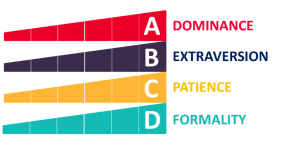What does The Predictive Index® assessments measure?
By Michaela Picones |
0.8 min read

The PI Behavioural Assessment™ measures workplace behaviour according to four key factors, known as “drives.” The four drives are: Dominance, Extraversion, Patience and Formality.
- Dominance is the drive to exert influence over people or events. Low-dominance individuals are more collaborative and cooperative, whereas high-dominance people are independent, assertive, and comfortable with conflict.
- Extraversion is the drive for social interaction. Low-extraversion individuals value privacy, reflection and analysis. High-extraversion people are sociable, crave connection, and value recognition.
- Patience is the drive to seek consistency and stability. Low-patience people need variety, work fast, and can handle multiple priorities, while high-patience people prefer steady paces and are generally stable and loyal to their organizations.
Formality is the drive to conform to rules and structure. Low-formality individuals need freedom and flexibility and tolerate ambiguity and spontaneity. High-formality people are disciplined and often see themselves as experts. They need clear expectations in order to minimize the risk of error for the company.
Reference: predictivesuccess.com
Related Blogs
How to Decide Who to Layoff?
How to Decide Who to Layoff? A Strategic Guide Powered by The Predictive Index In uncertain economic climates, tough decisions often become necessary for business continuity. One of the most challenging decisions any organization faces
HR Risk Management – Full Guide
HR Risk Management: A Full Guide with The Predictive Index Advantage In today’s volatile business environment, human capital remains one of the greatest assets—and one of the biggest risks. Organizations are navigating an increasingly complex
9 Tips for Hiring the Best Salesperson
9 Tips for Hiring the Best Salesperson (Backed by The Predictive Index) Hiring the right salesperson can feel like trying to find a needle in a haystack. Sales is a high-stakes role where the right



